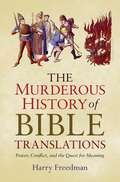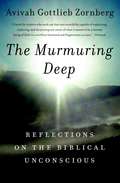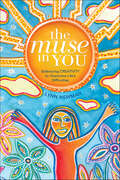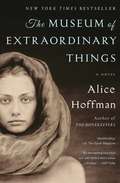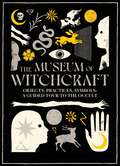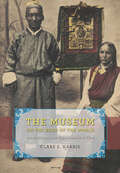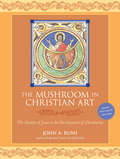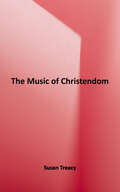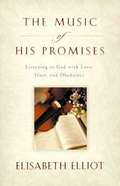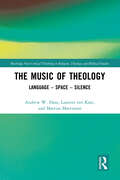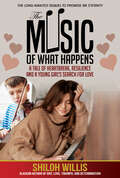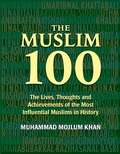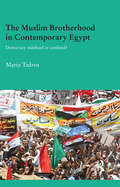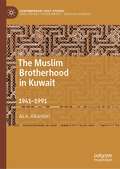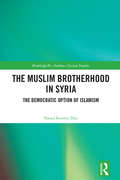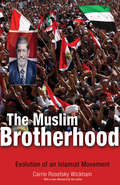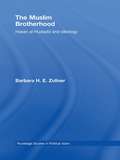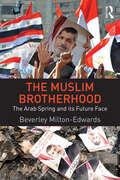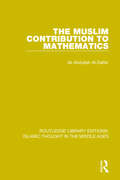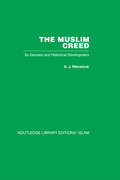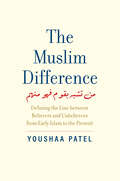- Table View
- List View
The Murderous History of Bible Translations: Power, Conflict and the Quest for Meaning
by Harry FreedmanHarry Freedman, author ofThe Talmud: A Biography, recounts the fascinating and bloody history of the Bible. In 1535, William Tyndale, the first man to produce an English version of the Bible in print, was captured and imprisoned in Belgium. A year later he was strangled and then burned at the stake. His co-translator was also burned. In that same year the translator of the first Dutch Bible was arrested and beheaded. These were not the first, nor were they the last instances of extreme violence against Bible translators. The Murderous History of Bible Translations tells the remarkable, and bloody story of those who dared translate the word of God. The Bible has been translated far more than any other book. To our minds it is self-evident that believers can read their sacred literature in a language they understand. But the history of Bible translations is far more contentious than reason would suggest. Bible translations underlie an astonishing number of religious conflicts that have plagued the world. Harry Freedman describes brilliantly the passions and strong emotions that arise when deeply held religious convictions are threatened or undermined. He tells of the struggle for authority and orthodoxy in a world where temporal power was always subjugated to the divine, a world in which the idea of a Bible for all was so important that many were willing to give up their time, security, and even their lives.
The Murmuring Deep: Reflections on the Biblical Unconscious
by Avivah Gottlieb ZornbergFrom one of the most innovative and acclaimed biblical commentators at work today, here is a revolutionary analysis of the intersection between religion and psychoanalysis in the stories of the men and women of the Bible. For centuries scholars and rabbis have wrestled with the biblical narrative, attempting to answer the questions that arise from a plain reading of the text. In The Murmuring Deep, Avivah Zornberg informs her literary analysis of the text with concepts drawn from Freud, Winnicott, Laplanche, and other psychoanalytic thinkers to give us a new understanding of the desires and motivations of the men and women whose stories form the basis of the Bible. Through close readings of the biblical and midrashic texts, Zornberg makes a powerful argument for the idea that the creators of the midrashic commentary, the medieval rabbinic commentators, and the Hassidic commentators were themselves on some level aware of the complex interplay between conscious and unconscious levels of experience and used this knowledge in their interpretations. In her analysis of the stories of Adam and Eve, Noah, Jonah, Abraham, Rebecca, Isaac, Joseph and his brothers, Ruth, and Esther-how they communicated with the world around them, with God, and with the various parts of their selves-Zornberg offers fascinating insights into the interaction between consciousness and unconsciousness. In discussing why God has to "seduce" Adam into entering the Garden of Eden or why Jonah thinks he can hide from God by getting on a ship, Zornberg enhances our appreciation of the Bible as the foundational text in our quest to understand what it means to be human.From the Hardcover edition.
The Muse in You: Embracing Creativity to Overcome Life's Difficulties
by Lynn NewmanEverything we do is creative: the way we think, the way we problem solve, the way we make the most of our lives. But when we experience challenging times, difficult life transitions, or grief from a loss, it’s easy for creativity to vanish and disquiet to settle in. In this guidebook to your emotional health, creativity expert Lynn Newman sends a powerful message: it is possible for you to remake your life into something extraordinary. Through personal stories, exercises, meditations, and inspired questions, learn to create a life on purpose by transcending conflict to find peace and happiness, unleashing the truest parts of yourself to experience more passion and ease, enjoying more fulfilling relationships, and following curiosity to jumpstart your creative journey. If you’re ready to shine more brightly, these lessons are your loving reminders that you are a creative being ready to accomplish your dreams! There is a muse in you!
The Museum of Extraordinary Things: A Novel
by Alice HoffmanThe &“spellbinding&” (People, 4 stars), New York Times bestseller from the author of The Dovekeepers: an extraordinary novel about an electric and impassioned love affair—&“an enchanting love story rich with history and a sense of place&” (USA TODAY).Coralie Sardie is the daughter of the sinister impresario behind The Museum of Extraordinary Things, a Coney Island freak show that thrills the masses. An exceptional swimmer, Coralie appears as the Mermaid in her father’s “museum,” alongside performers like the Wolfman and the Butterfly Girl. One night Coralie stumbles upon a striking young man taking pictures of moonlit trees in the woods off the Hudson River. The dashing photographer is Eddie Cohen, a Russian immigrant who has run away from his community and his job as a tailor’s apprentice. When Eddie photographs the infamous Triangle Shirtwaist Factory fire, he becomes embroiled in the mystery behind a young woman’s disappearance. And he ignites the heart of Coralie. Alice Hoffman weaves her trademark magic, romance, and masterful storytelling to unite Coralie and Eddie in a tender and moving story of young love in tumultuous times. The Museum of Extraordinary Things is, “a lavish tale about strange yet sympathetic people” (The New York Times Book Review).
The Museum of Witchcraft
by Diane PurkissEvery sense is tingling. Strange symbols loom out of the darkness, and incantations whisper through the air. It's cold and quiet, so why don't you feel completely alone? Welcome to The Museum of Witchcraft, a collection of 100 artefacts where a history of secret wisdom, female power and occult objects comes to life. Wander through its pages to discover why cooking is magic, which trees are most enchanted, how to create an amulet, where to find a witch mark and why bad weather could have you burned at the stake.With each page a beautiful display cabinet containing esoteric illustration and authoritative text, it's time to discover the shadowy world of witches.
The Museum of Witchcraft
by Diane PurkissEvery sense is tingling. Strange symbols loom out of the darkness, and incantations whisper through the air. It's cold and quiet, so why don't you feel completely alone? Welcome to The Museum of Witchcraft, a collection of 100 artefacts where a history of secret wisdom, female power and occult objects comes to life. Wander through its pages to discover why cooking is magic, which trees are most enchanted, how to create an amulet, where to find a witch mark and why bad weather could have you burned at the stake.With each page a beautiful display cabinet containing esoteric illustration and authoritative text, it's time to discover the shadowy world of witches.
The Museum on the Roof of the World: Art, Politics, and the Representation of Tibet (Buddhism And Modernity Ser.)
by Clare E. HarrisFor millions of people around the world, Tibet is a domain of undisturbed tradition, the Dalai Lama a spiritual guide. By contrast, the Tibet Museum opened in Lhasa by the Chinese in 1999 was designed to reclassify Tibetan objects as cultural relics and the Dalai Lama as obsolete. Suggesting that both these views are suspect, Clare E. Harris argues in The Museum on the Roof of the World that for the past one hundred and fifty years, British and Chinese collectors and curators have tried to convert Tibet itself into a museum, an image some Tibetans have begun to contest. This book is a powerful account of the museums created by, for, or on behalf of Tibetans and the nationalist agendas that have played out in them. Harris begins with the British public’s first encounter with Tibetan culture in 1854. She then examines the role of imperial collectors and photographers in representations of the region and visits competing museums of Tibet in India and Lhasa. Drawing on fieldwork in Tibetan communities, she also documents the activities of contemporary Tibetan artists as they try to displace the utopian visions of their country prevalent in the West, as well as the negative assessments of their heritage common in China. Illustrated with many previously unpublished images, this book addresses the pressing question of who has the right to represent Tibet in museums and beyond.
The Mushroom in Christian Art: The Identity of Jesus in the Development of Christianity
by John Rush Martin W. BallIn The Mushroom in Christian Art, author John A. Rush uses an artistic motif to define the nature of Christian art, establish the identity of Jesus, and expose the motive for his murder. Covering Christian art from 200 CE (common era) to the present, the author reveals that Jesus, the Teacher of Righteousness mentioned in the Dead Sea Scrolls, is a personification of the Holy Mushroom, Amanita muscaria. The mushroom, Rush argues, symbolizes numerous mind-altering substances—psychoactive mushrooms, cannabis, henbane, and mandrake—used by the early, more experimentally minded Christian sects.Drawing on primary historical sources, Rush traces the history—and face—of Jesus as being constructed and codified only after 325 CE. The author relates Jesus’s life to a mushroom typology, discovering its presence, disguised, in early Christian art. In the process, he reveals the ritual nature of the original Christian cults, rites, and rituals, including mushroom use. The book authoritatively uncovers Jesus’s message of peace, love, and spiritual growth and proposes his murder as a conspiracy by powerful reactionary forces who would replace that message with the oppressive religious-political system that endures to this day. Rush’s use of the mushroom motif as a springboard for challenging mainstream views of Western religious history is both provocative and persuasive.The package includes an informative DVD with 252 striking color images depicting Christian art, with key motifs indicated by the author.
The Music of Christendom: A History
by Susan TreacyMusic plays such an important part in everyone's life but how much do we know about the history of music? How did music shape our civilization and how was music itself shaped by the Catholic Church? Susan Treacy, an experienced professor of music, is an excellent guide to the history of music. Every Catholic should own at least one book on music. This is it.
The Music of His Promises: Listening to God with Love, Trust, and Obedience
by Elisabeth ElliotWhether you can take what life dishes out depends on what you take first. If you take from the grace of God the strength offered, you will find it absolutely sufficient to cover any need. You will find yourself quite amazingly able to bear the hardship of life's bitter battle as a good soldier. But the soldier has to be trained, prepared, and equipped first. Don TT rush into the fray and try to 'take it' without first taking strength." Take strength from these reminders of the loving sovereignty of the God who has called us His own. Bracing and calming at the same time, The Music of His Promises-fresh thoughts from the pen of Elisabeth Elliot-will soothe your soul and give you strength.
The Music of Home
by Tamela Hancock MurrayContent with where life finds her, Drusie happily plans her future with Gladdie, her handsome fiance. Gladdie has a dream to own the store he works in, but money is hard to come by in Sunshine Holler, North Carolina. And then Gladdie's cousin, a successful record producer, hears Drusie sing and offers her the chance of a lifetime. Gladdie doesn't know what to think when Drusie and her sister head to the city to make a record and go on tour. Drusie says she's only doing this to help him buy that store. But what will happen when she hits the big time-and when other men start to appreciate his girl? Can their homespun romance survive a tangle with the glamor and excitement of city life and show business? Or will the underside of that business tear them apart?
The Music of Theology: Language – Space – Silence (Routledge New Critical Thinking in Religion, Theology and Biblical Studies)
by Andrew Hass Mattias Martinson Laurens ten KateThis book reconceives theology as a musical endeavour in critical tension with language, space and silence. An Overture first moves us from music to religion, and then from theology back to music – a circularity that, drawing upon history, sociology, phenomenology, and philosophy, disclaims any theology of music and instead pursues the music in theology. The chapters that follow explore the three central themes by way of theory, music and myth: Adorno, Benjamin and Deleuze (language), Derrida, Rosa and Nancy (space), Schelling/Hegel, Homer and Cage (silence). In overdubbing each other, these chapters work towards theology as a sonorous rhythm between loss and freedom. A Coda provides three brief musical examples – Thomas Tallis, György Ligeti, and Evan Parker – as manifestations of this rhythm, to show in summary how music becomes the very pulse of theology, and theology the very intuition of music. The authors offer an interdisciplinary engagement addressing fundamental questions of the self and the other, of humanity and the divine, in a deconstruction of modern culture and of its bias towards the eye over the ear. The book harmonizes three scholarly voices who attempt to find where the resonance of our Western conceptions and practice, musically and theologically, might resound anew as a more expansive music of theology.
The Music of What Happens: A Tale of Heartbreak, Resilience, and a Young Girl's Search For Love
by Shiloh WillisThirteen-year-old Celina Zagoradniy-Montoya dreams of a different life; a life where her beloved father is alive again, where there's enough food and medicine for her sick brother, and where Mama doesn't have to work so hard. But when an answer to her impoverished family's prayers arrives in a form Celina did not anticipate and doesn't want, the conflicted young girl soon finds herself on a journey of self-discovery, a journey that leads her down a path wrought with fear, pain, and mistrust. Then, just as she is beginning to accept her new life, a stranger from the past appears and reveals the shocking secret Celina's mother has kept for years, a secret that will test Celina's faith and force her to question all she holds dear and leave her changed forever.
The Muslim 100
by Muhammad Mojlum Khan"It is rare to see a publication which includes personalities from both Shia and Sunni schools of thought and which is so much needed in today's turbulent world. This book, I believe will . . . enrich our understanding of not only the historical but the contemporary history of the Muslim."--Ahmed J. Versi, chief editor of The Muslim News (London)Who have been the Muslim world's most influential people? What were their ideas, thoughts, and achievements? In one hundred short and engaging profiles of these extraordinary people, fourteen hundred years of the vast and rich history of the Muslim world is unfolded. For anyone interested in getting an intimate view of Islam through its kings and scholars, generals and sportsmen, architects and scientists, and many others--this is the book for you.Among those profiled are the Prophet Muhammad, the Caliph Umar, Imam Husain, Abu Hanifa, Harun al-Rashid, al-Khwarizmi, al-Ghazali, Saladin, Rumi, Ibn Battuta, Sinan, Ataturk, Iqbal, Jinnah, Ayatollah Khomeini, Malcolm X, and Muhammad Ali.
The Muslim Brotherhood in Contemporary Egypt: Democracy Redefined or Confined? (Durham Modern Middle East and Islamic World Series)
by Mariz TadrosThe Muslim Brotherhood is one of the oldest and most influential Islamist movements. As the party ascends to power in Egypt, it is poised to adopt a new system of governance and state–society relations, the effects of which are likely to extend well beyond Egypt’s national borders. This book examines the Brotherhood’s visions and practices, from its inception in 1928, up to its response to the 2011 uprising, as it moves to redefine democracy along Islamic lines. The book analyses the Muslim Brotherhood’s position on key issues such as gender, religious minorities, and political plurality, and critically analyses whether claims that the Brotherhood has abandoned extremism and should be engaged with as a moderate political force can be substantiated. It also considers the wider political context of the region, and assesses the extent to which the Brotherhood has the potential to transform politics in the Middle East.
The Muslim Brotherhood in Kuwait: 1941–1991 (Contemporary Gulf Studies)
by Ali A. AlkandariThe Muslim Brotherhood (MB) is the most influential, organized, social, and political movement in Kuwait. With the succession in Kuwait, the role of the organisation become more interesting for people interested in Kuwait and Gulf domestic politics as well as those interested in the MB and Political Islam. This book traces the emergence and development of MB while considering the political and social development of Kuwait that led to its appeal. It explains the evolution of MB’s organisational structure and how it adapted itself during different periods in Kuwait’s history through the Social Movement Theory. It describes MB policies and strategies during challenging times. It traces the circumstances surrounding the emergence of the MB and focuses on its development and its mobilisation strategy. It is certainly one of the first focused studies on MB from its conception in 1941 up to 1991.
The Muslim Brotherhood in Syria: The Democratic Option of Islamism (Routledge/St. Andrews Syrian Studies Series)
by Naomí Ramírez DíazAnyone who follows world events has heard of the Muslim Brotherhood. Usually considered a fundamentalist religious organisation opposed to secular regimes, the so-called Arab Spring began to challenge this conception, and showed the MB’s commitment to democratic principles and elections, albeit with certain difficulties. Until now though, most analysis has focused on the Egyptian branch – the group that gave spiritual birth to the local branches in other countries – with very little having been studied about the Syrian Muslim Brotherhood, especially since the Hama massacre of 1982 and the formal disappearance of the group from Syria. This book provides a deep insight into the Syrian Muslim Brotherhood’s ideological evolution from its inception until present-day. Since Syria has unfortunately become the place where all forms of Islamism converge, understanding the SMB, their ideological evolution, and their potential role as moderating forces, is essential in order to debunk some clichés on the MB in general. Each chapter corresponds to a specific period in the SMB’s timeline, while the final chapter discusses how the endemic gerontocracy of the group calls for an urgent renovation of structures, and stresses the importance of younger generations in renovating the ideology of the SMB. Through the examination of original primary sources written by the SMB themselves, and relevant groups related to them, this book challenges the traditional categories applied to Islamist movements. It will therefore be a key resource for anyone studying Islamist movements, as well as for students and scholars of Middle East and North African Politics.
The Muslim Brotherhood: Evolution of an Islamist Movement - Updated Edition
by Carrie Rosefsky WickhamHow the Muslim Brotherhood rose to power in Egypt, and what it means for the Islamic worldFollowing the Arab Spring, the Muslim Brotherhood achieved a level of influence previously unimaginable. Yet the implications of the Brotherhood's rise and dramatic fall for the future of democratic governance, peace, and stability in the region are disputed and remain open to debate. Drawing on more than one hundred in-depth interviews as well as Arabic-language sources never before accessed by Western researchers, Carrie Rosefsky Wickham traces the evolution of the Muslim Brotherhood in Egypt from its founding in 1928 to the fall of Hosni Mubarak and the watershed elections of 2011-2012. Highlighting elements of movement continuity and change, Wickham demonstrates that shifts in Islamist worldviews, goals, and strategies are not the result of a single strand of cause and effect, and provides a systematic, fine-grained account of Islamist group evolution in Egypt and the wider Arab world.In a new afterword, Wickham discusses what has happened in Egypt since Muhammad Morsi was ousted and the Muslim Brotherhood fell from power.
The Muslim Brotherhood: Hasan al-Hudaybi and ideology (Routledge Studies in Political Islam)
by Barbara ZollnerThe Muslim Brotherhood is one of the most influential Islamist organisations today. Based in Egypt, its network includes branches in many countries of the Near and Middle East. Although the organisation has been linked to political violence in the past, it now proposes a politically moderate ideology. The book provides an in-depth analysis of the Muslim Brotherhood during the years of al-Hudaybi’s leadership, and how he sought to steer the organization away from the radical wing, inspired by Sayyid Qutb, into the more moderate Islamist organization it is today. It is his legacy which eventually fostered the development of non-violent political ideas. During the years of persecution, 1954 to 1971, radical and moderate Islamist ideas emerged within the Brotherhood’s midst. Inspired by Sayyid Qutb’s ideas, a radical wing evolved which subsequently fed into radical Islamist networks as we know them today. Yet, it was during the same period that al-Hudaybi and his followers proposed a moderate political interpretation, which was adopted by the Brotherhood and which forms its ideological basis today.
The Muslim Brotherhood: The Arab Spring and its future face
by Beverley Milton-EdwardsThe Muslim Brotherhood is the most significant and enduring Sunni Islamist organization of the contemporary era. Its roots lie in the Middle East but it has grown into both a local and global movement, with its well-placed branches reacting effectively to take the opportunities for power and electoral competition offered by the Arab Spring. Regarded by some as a force of moderation among Islamists, and by others as a façade hiding a terrorist fundamentalist threat, the potential influence of the Muslim Brotherhood on Middle Eastern politics remains ambiguous. The Muslim Brotherhood: The Arab Spring and its Future Face provides an essential insight into the organisation, with chapters devoted to specific cases where the Brotherhood has important impacts on society, the state and politics. Key themes associated with the Brotherhood, such as democracy, equality, pan-Islamism, radicalism, reform, the Palestine issue and gender, are assessed to reveal an evolutionary trend within the movement since its founding in Egypt in 1928 to its manifestation as the largest Sunni Islamist movement in the Middle East in the 21st century. The book addresses the possible future of the Muslim Brotherhood; whether it can surprise sceptics and effectively accommodate democracy and secular trends, and how its ascension to power through the ballot box might influence Western policy debates on their engagement with this manifestation of political Islam. Drawing on a wide range of sources, this book presents a comprehensive study of a newly resurgent movement and is a valuable resource for students, scholars and policy makers focused on Middle Eastern Politics.
The Muslim Contribution to Mathematics (Routledge Library Editions: Islamic Thought In The Middle Ages Ser. #6)
by Ali Abdullah Al-Daffa'This book, first published in 1977, discusses the Muslim contribution to mathematics during the golden age of Muslim learning from the seventh to the thirteenth century. It was during this period that Muslim culture exerted powerful economic, political and religious influence over a large part of the civilised world. The work of the Muslim scholars was by no means limited to religion, business and government. They researched and extended the theoretical and applied science of the Greeks and Romans of an earlier era in ways that preserved and strengthened man’s knowledge in these important fields. Although the main object of this book is to trace the history of the Muslim contribution to mathematics during the European Dark Ages, some effort is made to explain the progress of mathematical thought and its effects upon present day culture. Certain Muslim mathematicians are mentioned because of the important nature of their ideas in the evolution of mathematical thinking during this earlier era. Muslim mathematicians invented the present arithmetical decimal system and the fundamental operations connected with it – addition, subtraction, multiplication, division, raising to a power, and extracting the square root and the cubic root. They also introduced the ‘zero’ symbol to Western culture which simplified considerably the entire arithmetical system and its fundamental operations; it is no exaggeration if it is said that this specific invention marks the turning point in the development of mathematics into a science.
The Muslim Creed: Its Genesis and Historical Development
by A J WensinckOriginally published in 1932. This volume is a comprehensive study of the historical development of Muslim dogmatics and consists of translations and commentaries on the creed in its various forms.
The Muslim Difference: Defining the Line between Believers and Unbelievers from Early Islam to the Present
by Youshaa PatelA sweeping history of Muslim identity from its origins in late antiquity to the present How did Muslims across time and place define the line between themselves and their neighbors? Youshaa Patel explores why the Prophet Muhammad first advised his followers to emulate Christians and Jews, but then allegedly reversed course, urging them to &“be different!&” He details how subsequent generations of Muslim scholars canonized the Prophet&’s admonition into an influential doctrine against imitation that enjoined ordinary believers to embody and display their religious difference in public life. Tracing this Islamic discourse from its origins in Arabia to Mamluk and Ottoman Damascus, colonial Egypt, and beyond, this sweeping intellectual and social history offers a panoramic view of Muslim identity, revealing unexpected intersections between religion and other markers of difference across ethnicity, gender, and status. Patel illustrates that contemporary debates in the West over visible expressions of Islam, from headscarves and beards to minarets and mosques, are just the latest iterations in a long history of how small differences have defined Muslim interreligious encounters.
The Muslim Heritage of Bengal
by Muhammad Mojlum Khan"The Muslim Heritage of Bengal is a multidimensional work. . . . I am sure this book will add to the vista of knowledge in the field of Muslim history and heritage of Bengal. I recommend this work."-Dr A. K. M. Yaqub Ali, Professor Emeritus, Islamic History & Culture, University of Rajshahi"Khan's book provides invaluable information which will inspire present and future generations."-Dr M. Abdul Jabbar Beg, former professor of Islamic History and Civilization, National University of MalaysiaA popular history that covers eight hundred years of the history of Islam in Bengal through the example of forty two inspirational men and women up until the twentieth century. Written by the author of the bestselling The Muslim 100.Included are the prominent figures Shah Jalal, Nawab Abdul Latif, Rt. Hon. Syed Ameer Ali, Sir Salimullah Khan Bahadur, and Begum Rokeya.Muhammad Mojlum Khan was born in 1973 in Habiganj, Bangladesh, and was educated in England. He is a teacher, author, literary critic, and research scholar, and has published more than 150 essays and articles worldwide. He is the author of The Muslim 100 (2008). He is a Fellow of the Royal Asiatic Society of Great Britain and Director of the Bengal Muslim Research Institute, United Kindgom. He lives in England with his family.
